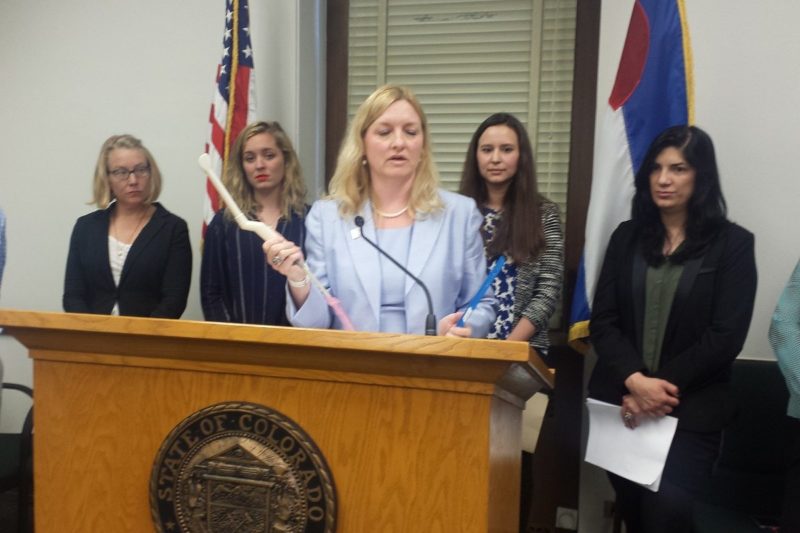Forced Waiting Period, Mandated Ultrasound Measures Go Down in Colorado
“Women of color and immigrant women already face significant obstacles to obtaining health care," Victoria Gómez Betancourt, spokesperson for the Colorado Organization for Latina Opportunity and Reproductive Rights, said at a news conference. "This means that any extra hoops and hurdles created by these bills will impact already marginalized women most of all."

Colorado pro-choice groups wielded an ultrasound wand in their fight against a GOP-backed bill mandating a 24-hour waiting period and the offer of an ultrasound before a patient could receive abortion care.
Democrats on the state House Health, Insurance, and Environment Committee, joined by one Republican, killed the bill late Thursday.
Holding up the device at a news conference Thursday prior to a hearing on the legislation, NARAL Pro-Choice Colorado’s Executive Director Karen Middleton said, “We are talking about a ten-inch-long medical instrument being inserted into a woman’s vagina. Frankly, I do not believe that kind of legislation passes the grimace test of most Colorado voters regardless of gender.”
To capture fetal activity and imagery during the first trimester, an ultrasound wand is used, rather than the “jelly on the belly” ultrasound procedure employed later in pregnancy, Middleton said.
“In Virginia,” Middleton continued, “They coined the phrase, ‘Government small enough to fit in one’s vagina.’ That’s not OK with me, and it’s not OK with Colorado health-care providers.”
To emphasize the point, Middleton pulled out a ruler and measured the eight-inch portion of the ultrasound wand that’s inserted.
The bill’s proponents argue that the ultrasound and other information required by the bill is aimed at making sure pregnant people are fully informed about abortion care.
“This is a wonderful bill,” Rep. Patrick Neville (R-Colorado Springs), said Tuesday on KLZ-560-AM’s Rush to Reason show. “The bill is rather simple. It just says a woman has the ability to see an ultrasound prior to an abortion.”
Along with the forced waiting period, the bill mandates not only that pregnant people have the “opportunity” to see an ultrasound of the “unborn child portraying the entire body,” but also that abortion patients are provided with an “oral description of the ultrasound” and the “presence or absence of a heartbeat,” the age of the fetus, and a description of the “child’s ability to feel pain at each stage of development.”
“Statistics show that, I think it’s, some 90 percent of women who actually see the ultrasound before an abortion decide not to go through with it,” said Neville on air. “For [Planned Parenthood], it hurts their revenue stream. So they are not going to like the bill.”
Neville, who chairs the committee that struck down the measure Thursday, did not return a call seeking the source for his figure of 90 percent. The fact-checking organization PolitiFact concluded that a similar statement, made by conservative pundit Rachel Campos-Duffy, was “false.”
The bill, along with a similar measure quashed last year by Colorado Democrats, appears to be based on copycat legislation created by the national anti-choice organization known as Americans United for Life.
A bill mandating ultrasounds prior to an abortion was struck down in 2014 by a North Carolina court. It was not heard by the U.S. Supreme Court, on grounds that it forced doctors to deliver politically motivated speech, even if a patient didn’t want to hear it.
Neville emphasized that this year’s legislation does not mandate an ultrasound, as last year’s did, but instead requires doctors to offer a patient the option of having one. Opponents interpret the language as requiring the procedure, with an option to see the results.
“This bill would turn a ten-minute procedure into a multi-day ordeal, and place the heaviest burden on low-income and minority women who can’t afford to take two days off of work or pay for overnight lodging,” Aaron Lazorwitz, an OB-GYN resident physician, said at the pre-hearing news conference. “Additionally, a 24-hour waiting period means physicians like myself would have to schedule twice as many appointments for each abortion, essentially cutting our ability to see patients in half and limiting access to care for all women.”
Pro-choice advocates echoed Lazorwitz’s comments.
“Women of color and immigrant women already face significant obstacles to obtaining health care, including: poverty, lack of transportation, linguistic and cultural barriers, and restrictions on health care for immigrant women,” Victoria Gómez Betancourt, spokesperson for the Colorado Organization for Latina Opportunity and Reproductive Rights (COLOR), said at the news conference. “This means that any extra hoops and hurdles created by these bills will impact already marginalized women most of all.”
State Sen. Laura Woods (R-Westminster) is the prime sponsor of the bill. Woods is pushing the anti-choice legislation despite warnings that her staunch anti-choice stances may result in her losing her senate seat in November, which would cost the GOP its slim state senate majority.

